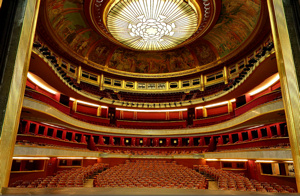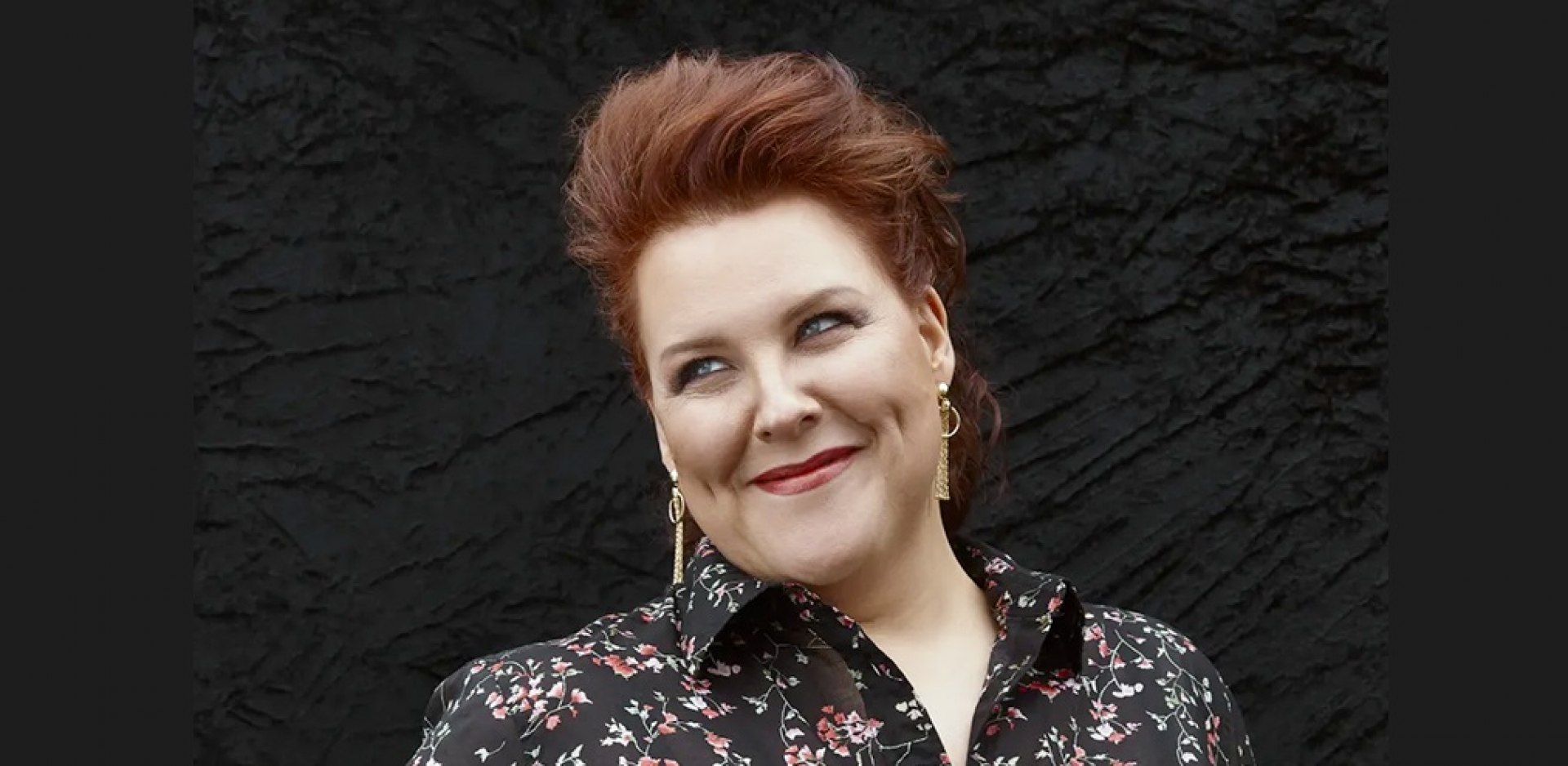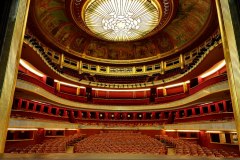L'italiana in Algeri
June 2025 | ||||||
|---|---|---|---|---|---|---|
Mo | Tu | We | Th | Fr | Sa | Su |
Since the late seventeenth century, theatre and music alike had exhibited a pronounced taste for the East and its perceived exoticism. Molière’s Bourgeois was promoted to the rank of Grand Mamamouchi and Mozart slipped into a seraglio straight out of The Arabian Nights. For his part, the young Rossini painted a picture of the imagined charms of the East with his Italian in Algeri. This is one of his most exquisite successes; the virtuosity of the writing for both voices and orchestra is a dazzling feast for the senses. Julien Chauvin and his ensemble Le Concert de la Loge, who gave us a sparkling Abduction from the Seraglio last season, will bring all their energy to bear on it.
Synopsis
Place: Algiers
Time: The past
Act 1
The palace of the Bey of Algiers
Elvira accompanied by her slave Zulma regrets the loss of the love of her husband, the Turkish Bey Mustafà. Left alone with Haly (since the Italian 'h' is silent, this corresponds to the name Ali, more familiar in the English-speaking world), Captain of the Corsairs, Mustafà reveals his plan to marry Elvira off to Lindoro, his Italian slave. The Bey is bored with his submissive harem, desiring a new challenge to his virility: he wants an Italian girl, and Haly must find one! Lindoro enters alone and sings about Isabella, his true love (Languir per una bella). Mustafà comes in to explain Lindoro's impending marriage. The enthusiastic Bey describes the attractions of the match, while Lindoro struggles to refuse (Se inclinassi a prender moglie).
The seashore
A ship has been wrecked in a storm. Its passengers include Isabella, in search of Lindoro, and Taddeo, her travelling companion and would-be lover. Isabella enters with a sorrowful cavatina Cruda sorte! Amor tiranno!, however she is not afraid (Già so per pratica) and will master the situation. Haly and his men take them prisoner. She passes off Taddeo as her uncle. Haly is delighted to learn she is an Italian – exactly what the Bey wanted! Left to consider their fate, Isabella is irritated by Taddeo's jealousy of Lindoro (Ai capricci della sorte), but they resolve to join forces.
The palace
Back in the palace, Lindoro and Elvira do not wish to marry, but Mustafà offers Lindoro passage on a ship returning to Italy if he takes Elvira. Lindoro agrees, admitting a vague possibility of marrying her in Italy. Haly enters with news of the arrival of the Italian beauty. Mustafà is elated (Già d'insolito ardore nel petto agitare).
Surrounded by eunuchs (Viva, viva il flagel delle donne), Mustafà receives Isabella in a grand hall. He is enchanted, though she is rather amused by his appearance (Oh! Che muso, che figura!). At that moment, Lindoro, Elvira and Zulma arrive to say goodbye to Mustafà (Pria di dividerci da voi, Signore). Lindoro and Isabella are astonished to come face to face. Recovering herself, Isabella asks about Elvira, learning she is Mustafà's ex-wife, who is being sent away to Italy, where she is to marry Lindoro. Isabella demands that Mustafà allow Elvira (and therefore Lindoro) to remain in Algiers, telling Mustafà that he does not know how to love (Voi non sapete amar). Mustafà capitulates to Isabella's insistence. The act ends with an ensemble of confusion (Confusi e stupidi).
Act 2
In the palace
Elvira and Zulma note Isabella's skill with men. Mustafà reveals his strategy for seducing Isabella: he installs Lindoro as Isabella's servant and his informer, and Taddeo will also be induced to help. Elvira and Zulma must tell Isabella he is coming to take coffee with her.
Isabella and Lindoro are alone. He explains that he had no intention of marrying Elvira. They agree to escape together and Lindoro sings of his happiness (Ah come il cor di giubilo). Mustafà enters with a reluctant Taddeo, acclaimed by the Turks as "Lord Kaimakan" (Viva il grande Kaimakan). He dislikes interceding with Isabella for the Bey, but is frightened to refuse (Ho un gran peso sulla testa).
In her apartment
Isabella is dressing in Turkish style. Zulma and Elvira deliver Mustafà's message: he is coming for coffee. Isabella orders three cups. Elvira should wait in a side room. As Mustafà approaches, Isabella sings a romantic cavatina, Per lui che adoro – she will receive him. Mustafà tells Taddeo to leave when he sneezes (Ti presento di mia man). Isabella greets Mustafà warmly and he sneezes, but Taddeo ignores the signal. Isabella calls for coffee and then – to Mustafà's horror and amazement – invites Elvira to join them.
Elsewhere in the palace
Haly sings in praise of the women of Italy (Le femmine d'Italia). The Italians enter, and Taddeo reveals to a surprised Lindoro that he is not her uncle but her lover (he himself is unaware of the other man's true identity). Lindoro tells Mustafà that Isabella will declare him her adored pappataci ("sandfly," literally "silent eater": a man unable to resist the opposite sex). This, as Lindoro explains (Pappataci! Che mai sento!), is an Italian custom and a great honour, as the pappataci enjoy an idyllic life dedicated to eating, drinking and sleeping. Zulma and Haly speculate about Isabella's real intentions and the quantity of alcohol ordered for the ceremony.
Isabella's apartment
She addresses the Italian slaves who will be pappataci in the ceremony – she will lead them to freedom (Pensa alla patria). The ceremony begins (Dei pappataci s'avanza il coro); Mustafà is delighted with his new honour and changes into appropriate costume. Isabella explains his obligations. He must swear an oath of eating, drinking, and keeping silent, repeating the words after Taddeo. Following that his oath is tested, under provocation by Isabella and Lindoro.
A European ship lies alongside the palace: time to escape! Taddeo finally realizes who Lindoro is, but decides to go along with them anyway. Elvira, Zulma and Haly find the Bey still acting as a mad pappataci. Suddenly recovering his sanity, Mustafà calls his troops but they are all drunk. The Italians bid farewell and Mustafà begs Elvira's forgiveness. No more Italian girls for him!
Program and cast
Sung in Italian, subtitled in French and English.
Approximate running time 2h20
Marie-Nicole Lemieux | Isabella
Levy Sekgapane | Lindoro
Nahuel Di Pierro | Mustafa
Mikhail Timoshenko | Taddeo
Sulkhan Jaiani | Haly
Eléonore Pancrazi | Zulma
Julie Roset | Elvira
Julien Chauvin | direction
Le Concert de La Loge
Théâtre des Champs-Élysées

The Théâtre des Champs- Elysées is undoubtedly one of the finest venues in Paris . Built in 1913 , it has the distinction of having been designed by a group of artists architects Henry Van de Velde and Auguste Perret , the painter and sculptor Antoine Bourdelle , the painter Maurice Denis , and the crystal- René Lalique to do mention the main ones . He was the first Parisian theater to be built entirely of reinforced concrete.
Restoration of the Great Hall devoted to operatic performances , symphony concerts and dance was decided in 1985. Two years later , on 23 September 1987, the theater reopened its doors , completely renovated. Fifteen years after this important work it was decided to undertake a new renovation campaign , but to prevent the complete closure of the theater for an entire season , work is now carried by step during the summer . Then it is to replace aging equipment , to remedy wear certain parts of the theater and improve spectator comfort and artists during their visit . Thus in recent years, including the work involved the renovation of marble facade, replacing the carpet in the room with wooden floors , installation of a new fully decorated wooden concert to a significant improvement of acoustics, the orchestra pit and stage below .
The Théâtre des Champs- Elysées is now a modern working tool receiving each year nearly 300,000 spectators and a few thousands of artists and collaborators.
The Théâtre des Champs- Elysées , the jewel of French architecture of the twentieth century, was in 1953 one of the first buildings of contemporary architectural heritage to be classified as historic monuments . Since 1970 the Caisse des Dépôts owns the entire building 15 avenue Montaigne and principal patron of the theater.
For over a century, Théâtre des Champs-Elysées has been the place where the most celebrated artists have come to make their names in Paris. The world’s finest orchestras and world-class soloists have always been a fixture at the Theatre. Théâtre des Champs-Elysées presents more than 200 concerts each year and is renowned for its outstanding performances of all genres, from classical music concerts and staged opera to contemporary dance and jazz.
How to reach us:
Subway: Alma-Marceau (line 9), Franklin D.Roosevelt (line 1), Pont de l’Alma (RER line C)
Bus: n° 42, 63, 72, 80, 92
Taxi station: Place de l’Alma, corner of avenue George V
Car park: Alma George V. The entrance is in front of n° 19, avenue George V
Fixed rate depending on the length of the performance. Payment upon entering.
Performances: Fr 20 Dec 2024,
Performances: Su 07 Jul 2024,
Performances: Su 07 Jul 2024,
Performances: Mo 08 Jul 2024,
Performances: Su 07 Jul 2024,
Performances: Fr 12 Jul 2024,

 EN
EN DE
DE IT
IT FR
FR ES
ES RU
RU JP
JP RO
RO
 Seating plan
Seating plan 





